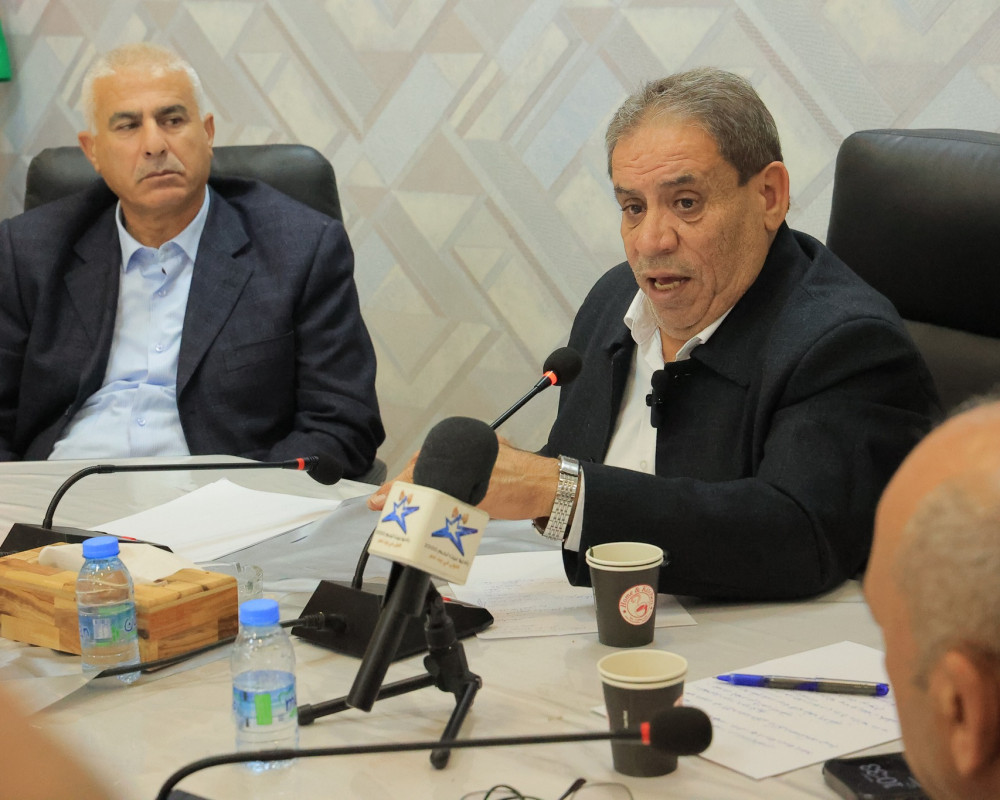Middle East
The European Union and Bethlehem Chamber of Commerce Organize Awareness Events on EU Funding Programs
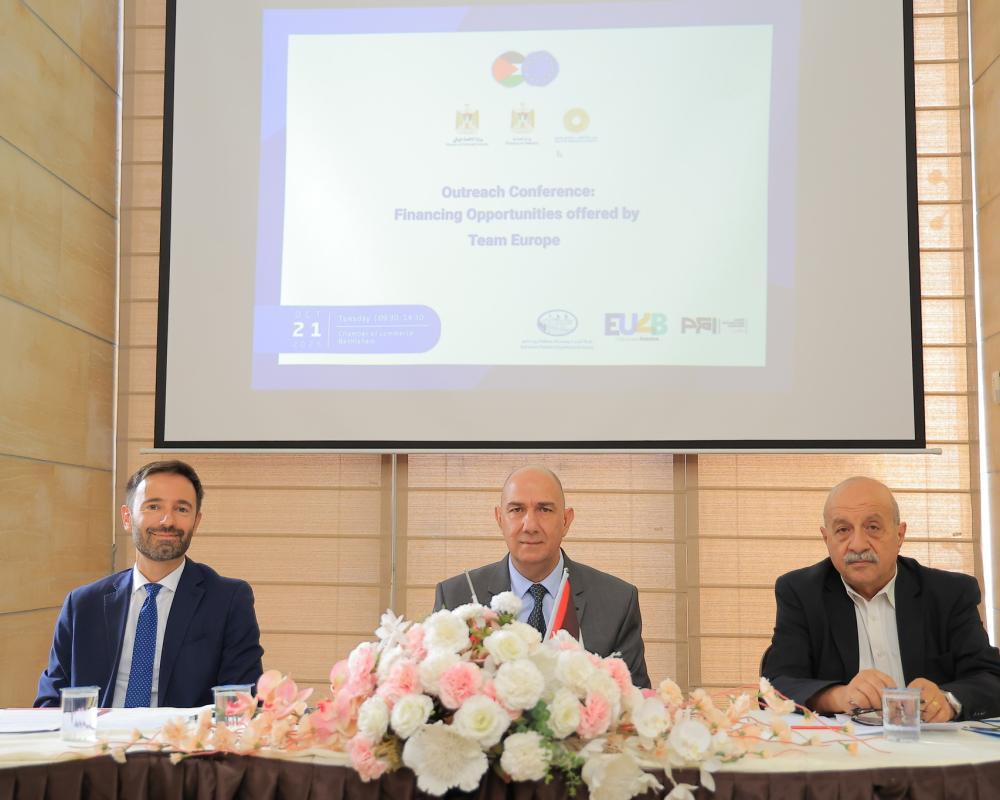
Bethlehem / PNN /
The European Union (EU) Delegation in Palestine, in cooperation with the Bethlehem Chamber of Commerce and Industry, organized an awareness event on European funding programs and instruments. The event aimed to introduce representatives of the Palestinian private sector to the financing opportunities offered by global and European programs through Palestinian banks.
The event brought together EU representatives, members of both the public and private sectors, Palestinian industrial unions, as well as Palestinian banks and private sector company owners.
Dr. Hazboon: The Meeting Aims to Contribute to Improving Bethlehem’s Challenging Economic Situation
At the beginning of the meeting, Dr. Samir Hazboon, President of the Bethlehem Chamber of Commerce, welcomed the attendees on behalf of himself and the Chamber members. Participants included representatives from various ministries—most notably the Ministries of Industry and Economy—the European Union, Palestinian banks, as well as owners of Palestinian companies and factories.
Dr. Hazboon explained that the meeting aimed to introduce European funding instruments designed to support small and medium-sized enterprises through accessible and simplified financing programs. He expressed hope that the day’s activities would be fruitful in collaboration with European institutions, with the presence of EU representatives, and members of both the Palestinian public and private sectors.
He emphasized that the participation of deputy ministers from the Ministries of Industry and Economy, representatives of governmental institutions, industrial unions, chambers of commerce, the Federation of Palestinian Industries, the Palestinian Monetary Authority, banks, and financing institutions represents a valuable opportunity to strengthen collective cooperation in ways that serve the Palestinian economy and society, enhancing resilience under current conditions.
Dr. Hazboon also thanked the EU and Chamber teams for their cooperation and expressed hope that the event would provide an opportunity to exchange expertise and showcase opportunities, contributing to the sustainability of the Palestinian economy and its ability to face crises and challenges. He noted the existence of 123 checkpoints and gates at the entrances to Bethlehem’s cities, villages, and camps, which hinder economic activity, and called on the European Union to assist Bethlehem in ending the imposed restrictions that cut off internal and external connectivity, negatively affecting tourism and all economic and commercial sectors.
Dr. Hazboon also stated that the event provided a unique opportunity for EU representatives, Palestinian banks, the Monetary Authority, industrial unions, and government ministries to engage openly and transparently, fostering a collaborative approach to strengthening the Palestinian economy. He emphasized that the participation of Palestinian banks was particularly important, as they have received financing through European banks and funding programs, allowing them to share detailed insights. He praised the efforts and contributions of the banks operating in Bethlehem.
He further highlighted the importance of leveraging initiatives such as the Economic Resilience Enhancement Conference and stressed the need for continued cooperation with the European Union, underscoring that Bethlehem requires significant support to revive its challenging economic situation.

Ministry of Economy: Working with All Stakeholders to Strengthen the Sustainability of the Palestinian Economy
Nahed Qudsi, Head of the Palestinian Ministry of National Economy’s Cabinet, highlighted the significance of the day’s meeting, expressing his gratitude to the European Union and European development and reconstruction banks for their various financing programs. He also thanked the Bethlehem Chamber of Commerce, the Ministry of Industry, Palestinian financial institutions, and industrial unions, expressing hope that European funding tools would be transformed into opportunities to strengthen the private sector, which the Ministry of Economy aims to develop.
Qudsi noted that the Palestinian economy is facing one of its most difficult periods due to Israeli occupation practices. He pointed out that Bethlehem is a vital economic and cultural hub and an important source of tourism revenue. However, the sector—and the broader local economy—has suffered due to political instability and Israeli military operations against the Palestinian people.
He emphasized that the Ministry is focusing on promoting sustainability programs, highlighting ongoing cooperation with the European Union across multiple sectors to revitalize economic activities, improve the business environment, facilitate company registration, and implement competition and e-commerce laws to encourage investment.
Qudsi expressed hope that the event would help bridge gaps between financial institutions and businesses, particularly small and medium enterprises, enabling them to explore opportunities through EU sustainability and support programs. He stressed that the Ministry is simultaneously developing collaborative programs between the public and private sectors, calling for a strategic dialogue among all stakeholders, especially Palestinian public and private institutions.
He also called on the European Union to expand support programs and urged Palestinian banks to enhance and facilitate funding initiatives for local enterprises. Qudsi extended his gratitude for European support programs that empower diverse economic sectors, including tourism, industry, and agriculture.
Meanwhile, Samhan emphasized the aim of reaching understandings during the meeting on multiple issues that serve to strengthen Palestinian industry.

Ministry of Industry and European Union: Supporting Palestinian Private Sector and Economic Recovery
Zaghloul Samhan, Undersecretary of the Ministry of Industry, thanked the attendees and organizers of the meeting, emphasizing the importance of discussing financing tools. He highlighted that access to funding is a key concern for the private sector, particularly for small and medium-sized enterprises. He also expressed gratitude to the European Union for providing financial platforms that enable Palestinian businesses to benefit from European funding programs, opening opportunities for the development of various projects.
Samhan stressed that the Ministry of Industry aims to reach agreements during the meeting on several key issues, including unifying efforts and providing financing platforms for the private sector. He underscored the Ministry’s commitment to working with government partners, the private sector, and unions to remove obstacles facing private enterprises, particularly in licensing, monitoring, and creating a legal and supportive environment. He cited measures such as protecting national products through mandatory national procurement policies as part of this effort.
He described the day’s event as a valuable opportunity to explore existing opportunities and facilitate private sector access to financing tools, reiterating his thanks to the European Union and expressing hope for the expansion and enhancement of support in both quantity and quality.
European Union: Working to Revive the Palestinian Economy
Mario Giuseppe Farneti, Head of the Cooperation Section at the European Union, expressed his pleasure at being in Bethlehem, a city rich in history. He thanked the Chamber of Commerce for organizing the first event in a series of EU-led initiatives across Palestinian governorates aimed at raising awareness about European financing tools. He also expressed appreciation for the participation of the Ministries of Industry and Economy, financial institutions, and the private sector, noting that such strong attendance reflects the Palestinian community’s interest in European funding during a critical period for the Palestinian economy, following two years of conflict.
Farneti expressed hope that the EU’s efforts will contribute to economic recovery and reconstruction by promoting available funding and support opportunities. He emphasized the EU’s belief in the importance of the private sector in building a resilient Palestinian national economy, noting that in recent years, the EU has provided hundreds of millions of dollars to support the Palestinian economy.

EU Officials and Palestinian Industry Unions Highlight Support for Economic Resilience
Mario Giuseppe Farneti, Head of the Cooperation Section at the European Union, expressed pride in supporting small projects through EU funding programs over the past five years. He emphasized the ongoing need for further work to strengthen the Palestinian economy and make it resilient.
He stated, “To achieve this, the European Union has decided to organize events to open opportunities for the private sector and financial institutions to learn about our programs, fostering cooperation and awareness of EU funding initiatives.” Farneti added, “We decided to start in Bethlehem due to its unique circumstances, and we will soon conduct similar events in Jericho, Hebron, and Jenin, with a commitment to working in Gaza once the situation stabilizes.”
He confirmed that the purpose of these meetings is to pave the way for financing deals by introducing the funding opportunities provided by the EU, which are expected to contribute to strengthening the Palestinian economy.
Explanation of European Funding Mechanisms
Metya Goor Guenbour, Head of the Economic Development Policy Section at the EU Representative Office in Palestine, provided a detailed presentation on the EU’s economic policies and its cooperation with international and European banks to support the Palestinian economy. He highlighted that the EU has provided approximately €173 million through European banks and over €900 million through international institutions.
Guenbour explained the mechanisms of financing, guarantees, and support for both public and private sectors, detailing the technical aspects of projects eligible for funding, loan structures, facilitation rates, and required guarantees. He also emphasized the cooperation with the Palestinian Monetary Authority and local banks in implementing these programs.
Industry Unions and Chambers of Commerce Discuss Efforts to Strengthen the Economy
Suha Awadallah, Secretary-General of the Federation of Palestinian Industries, expressed appreciation for the organization of the event and thanked the European Union for its support, while also recognizing the role of the Chamber of Commerce and government ministries. She emphasized the importance of informing stakeholders in Gaza about European funding opportunities in the upcoming phase.
Awadallah highlighted the importance of data and statistics to understand the needs of the sector through an industrial registry that provides insights into the economic reality, challenges, and available opportunities.
She noted that the Federation has developed statistics, programs, and plans to assist the private sector, detailing the Federation’s activities and achievements over recent years to contribute effectively to strengthening and developing Palestinian industries.

Palestinian Chambers and Monetary Authority Highlight Efforts to Strengthen the Economy
Jamal Al-Jawabreh, Secretary-General of the Union of Chambers of Commerce, spoke about the economic reality across various Palestinian governorates and the challenges facing the economy, as well as the obstacles hindering the development of multiple sectors.
Al-Jawabreh highlighted the economic needs required to develop different sectors, including the shortage of services, the need to diversify the economy, and the importance of promoting economic services while developing marginalized groups, particularly women and youth. He noted that the Union of Chambers of Commerce has signed agreements with donor organizations to help strengthen the economy. Additionally, the Union has launched an electronic platform to promote local products and signed agreements with banks to facilitate financing for industries.
Monetary Authority: Supporting the Economy through Banks and EU Funding Cooperation
Mahamoud Barhoum, a member of the Palestinian Monetary Authority Council, discussed the Authority’s efforts to support the Palestinian economy across various sectors. He highlighted the “Sustainability” program, which was launched during the COVID-19 pandemic and restructured two years later to support micro, small, and medium enterprises, focusing on educational and healthcare sectors and digital transformation, continuing to the present day.
Barhoum also presented the “My Projects” program, which includes consulting, training, and financing, noting the complementarity between the Sustainability and My Projects programs. Together, they have financed around 5,000 projects totaling $250 million. He mentioned the “Bader” program for workers, aimed at creating projects and facilitating access to support. Barhoum expressed hope that the meeting would lead to providing small businesses with financing, training, and legal consultancy that could benefit from EU funding programs and loans. He emphasized that banks are ready to provide guidance on the Sustainability and My Projects programs and the associated financing mechanisms.
Open and Transparent Discussion
At the end of the meeting, an open discussion was held, where representatives from various unions and private sector companies shared their experiences, working conditions, and lack of sufficient information about funding programs and their requirements. Representatives from the EU’s Economic Development Policy Section responded to many of these questions, providing clarification and guidance.





Source link
#European #Union #Bethlehem #Chamber #Commerce #Organize #Awareness #Events #Funding #Programs
Middle East
CFI Unveils Climate and Environment Media Works From Jordan, Palestine, Lebanon and Iraq
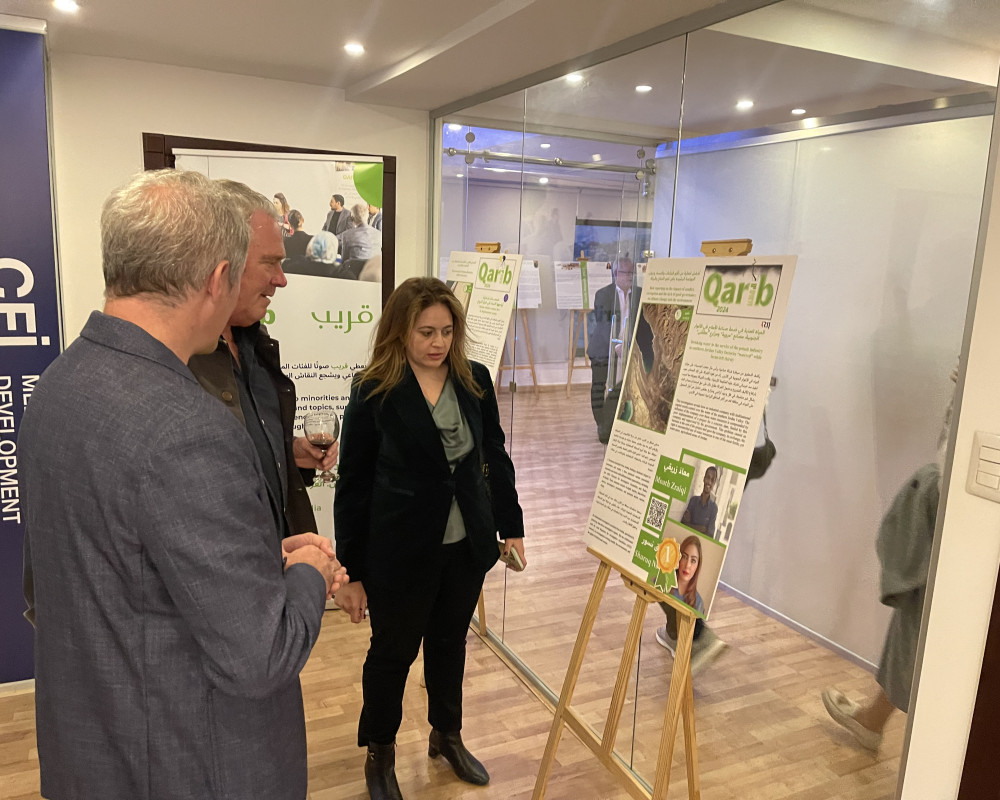
Amman / PNN /
The French media development agency CFI organised an art exhibition showcasing reports and stories produced under its environment and climate project, funded by the French Development Agency (AFD). The initiative trained journalists from four Arab countries to produce climate-related reports aimed at raising public awareness in the region about the importance of environmental protection.
The exhibition was held at CFI’s office in Amman, attended by the agency’s global director Emanuela Tolan, AFD’s regional director Yves Gescoro, QARIB programme director Henrik Erhnäs, QARIB editor-in-chief Nada Abdel Salam, representatives of various Arab media outlets, several media donors and members of the QARIB team in Jordan.
Henrik Ahrens, director of the QARIB media-development project, told PNN that CFI is hosting the exhibition to highlight climate and environmental productions created within the programme across four Arab countries. He said the goal is to inform audiences in Jordan, Palestine, Lebanon and Iraq about the importance of protecting the climate and countering negative environmental impacts.
Ahrens said the name “QARIB” was chosen because the programme seeks to bring journalists from the four countries closer together and produce stories that resonate “closely with the mind and the heart.” He added that the project is built on the idea of supporting independent media and enabling journalists from smaller outlets to participate in global climate summits, while also amplifying the voices of marginalised communities through stronger media coverage.
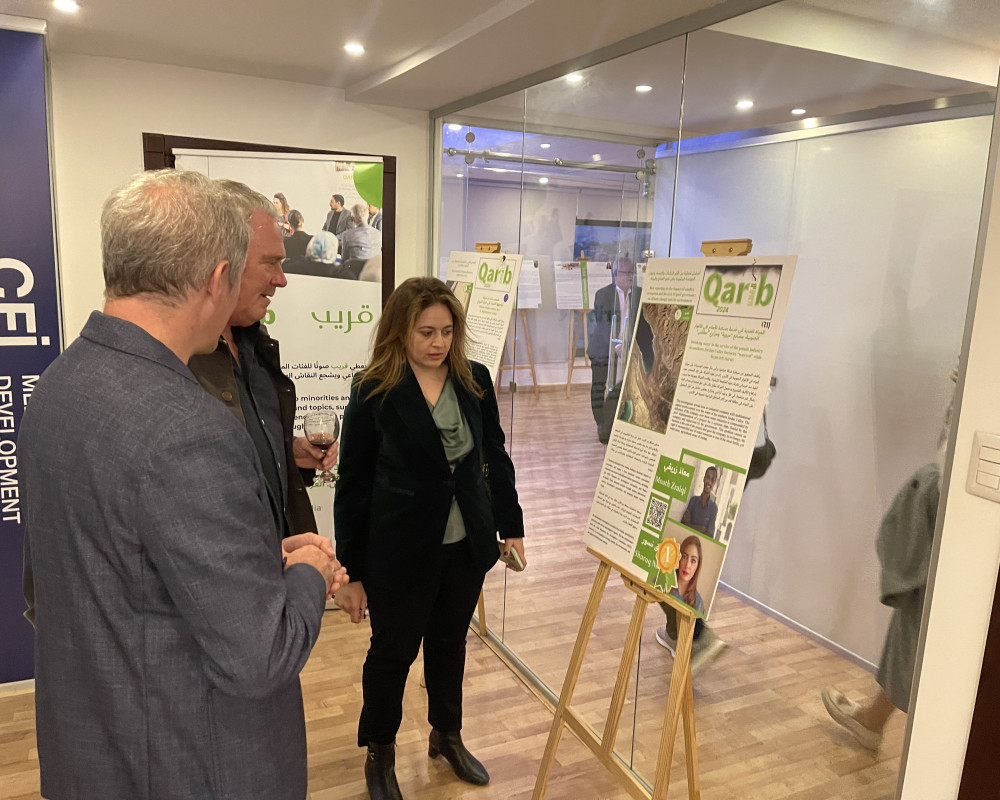
He noted that QARIB has allowed participating journalists to cover global discussions and negotiations on protecting the planet and preventing harmful climate change by raising public awareness. The exhibition, he added, is an opportunity to highlight what the journalists have achieved—written, visual and broadcast stories documenting climate-related issues.
Ahrens said CFI and QARIB trained groups of journalists and independent media professionals in the four countries on environmental and climate reporting. Journalists were supported to attend recent UN climate summits, where they produced in-depth coverage of global negotiations. Many have since developed the ability to create specialised environmental content that raises awareness in their communities.
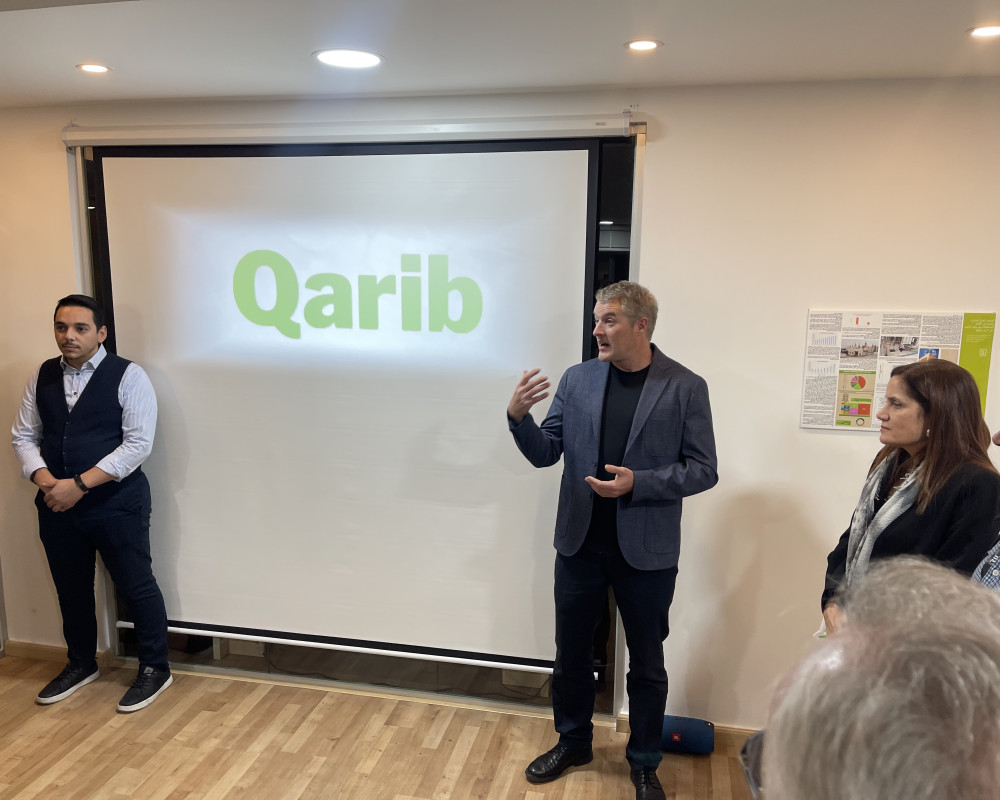
The multi-year project provided training for independent media outlets in the four Arab countries, including PNN, aiming to build journalists’ skills and open opportunities for them to join international climate conferences.
Environmental journalist and trainer Suzanne Baaklini said QARIB trained journalists on key issues discussed at climate summits, including climate-finance negotiations, the responsibilities of major industrial countries, and the measures needed to mitigate negative environmental impacts. She said participants have since produced strong climate and environment reporting both during summits and in their home countries.

Journalists benefiting from the programme expressed their gratitude during the exhibition, stressing that the experience opened new horizons they hope to build upon.
Monjed Jadou, editor-in-chief of Palestine News Network (PNN) and founder of the “Arab Journalists for Climate” platform, said the network was proud to be part of the project. He thanked CFI and AFD for allowing PNN to cover the climate summits for several years, helping deepen regional climate reporting and raise awareness among Palestinian and Arab audiences. He noted that international reports indicate the Mediterranean Basin is among the regions most vulnerable to climate impacts and could become increasingly uninhabitable in the future.
Jadou highlighted the Arab Journalists for Climate initiative, which participating journalists agreed to establish during the climate summit in Azerbaijan.
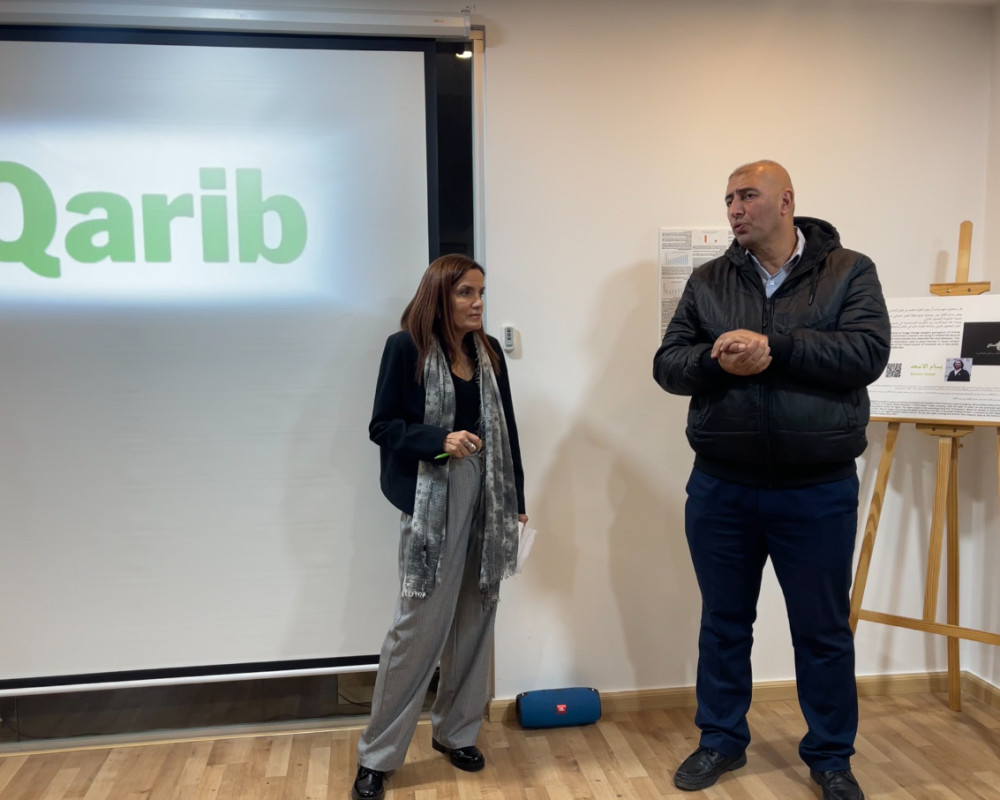
The volunteer-run platform covers Arab climate and environmental issues and currently seeks support to expand its work. He expressed hope that CFI would be one of its first supporters.
Lebanese journalist and climate-film producer Karam Mandar said QARIB allowed him to closely follow developments at the climate summits. After attending the past three conferences, he produced several short films on climate issues relevant to Lebanon and the wider Arab region. He expressed hope that independent media would continue to thrive in the four countries, as it plays a crucial role in amplifying public concerns, including environmental protection and climate challenges.
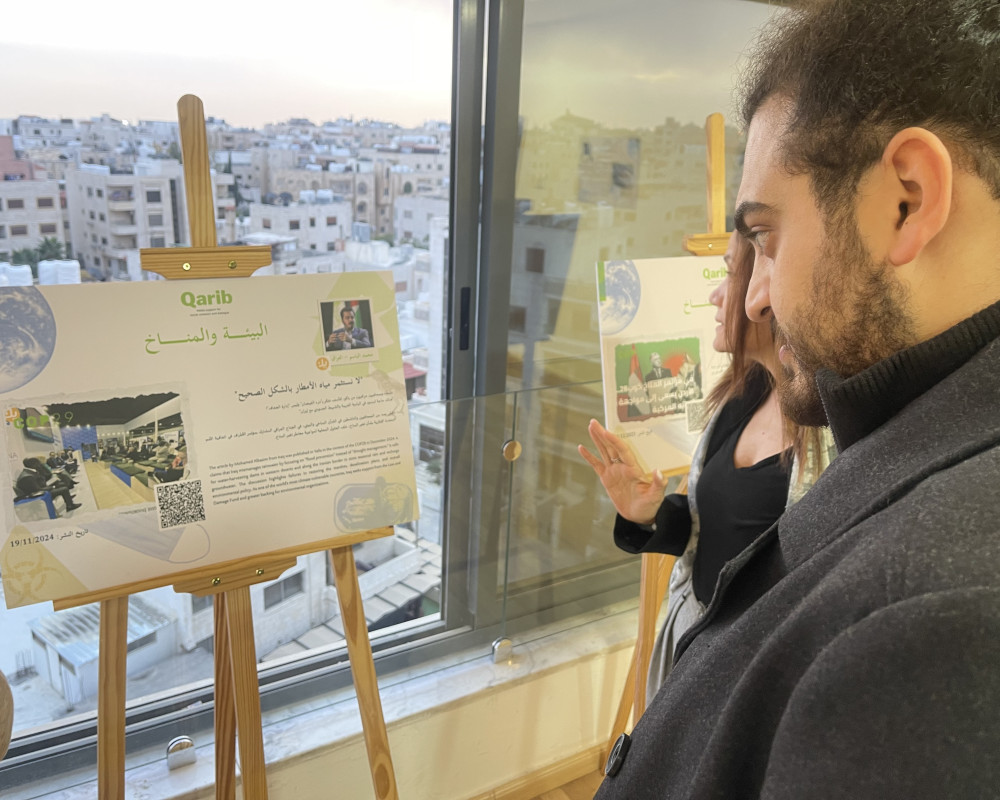
Mounia Dweik, director of the “Roya Palestine” channel, said the channel has recently developed its coverage of war-related environmental impacts, producing reports on the consequences of conflict on climate, land degradation, water pollution and soil contamination. She stressed the importance of addressing these issues.
Dweik added that the channel also prepared extensive climate-summit coverage, highlighting Palestinian issues throughout the events.
Jordanian journalist Abdulrahman Makawi, director of Jordan’s Aramram News, said the QARIB climate and environment project provided him with essential exposure to climate and water issues, which are of major concern to the Jordanian public. He said the outlet has since produced numerous specialised environmental reports. Makawi thanked CFI and the QARIB team for supporting young Jordanian journalists and expressed hope for more such opportunities.
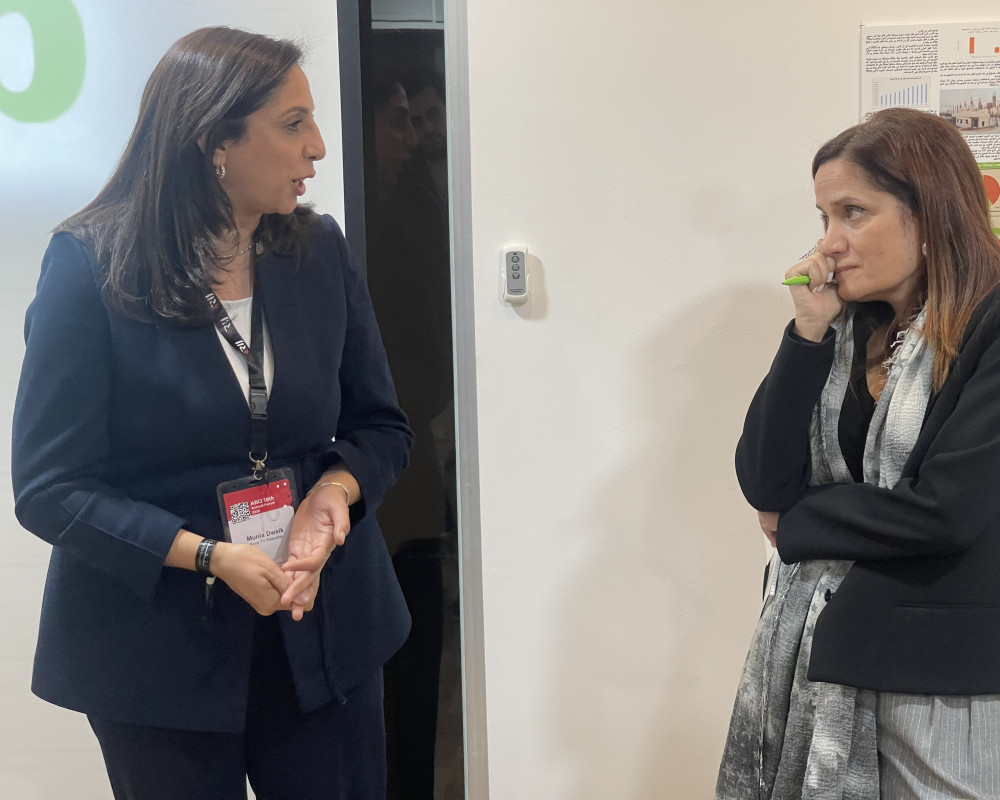
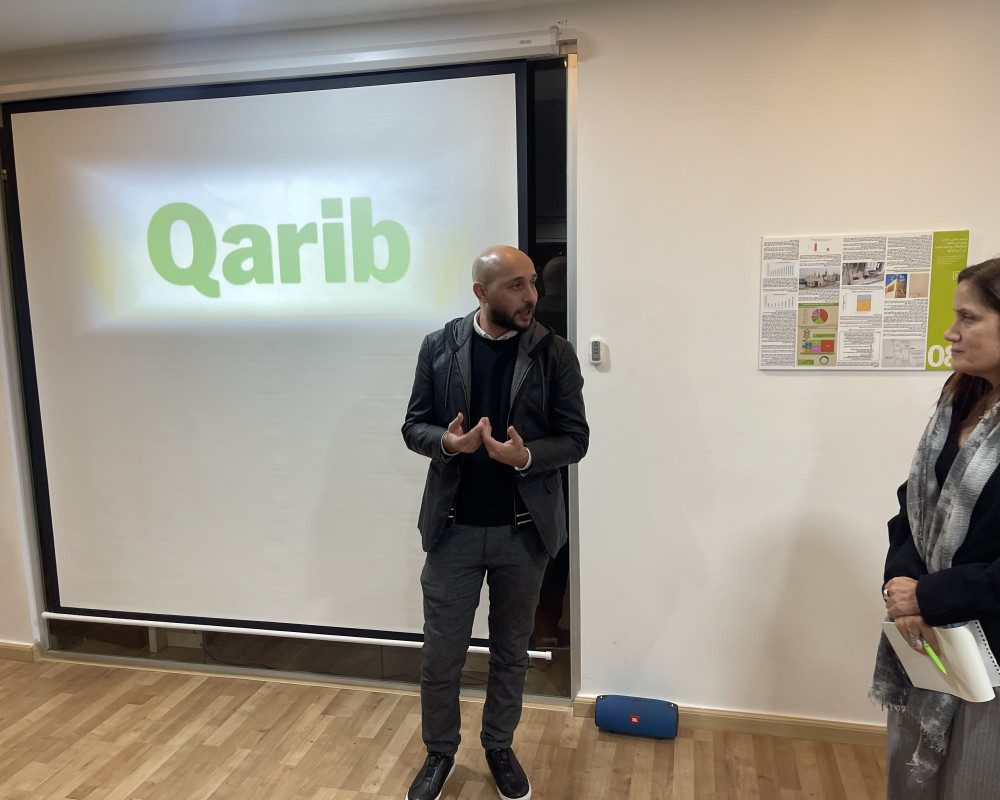
The photographs showcased at the CFI exhibition—drawn from the climate reports produced through the programme—illustrated success stories and underscored the need for more support to strengthen environmental protection efforts and raise climate awareness across Arab societies, which remain among the regions most affected by climate change.
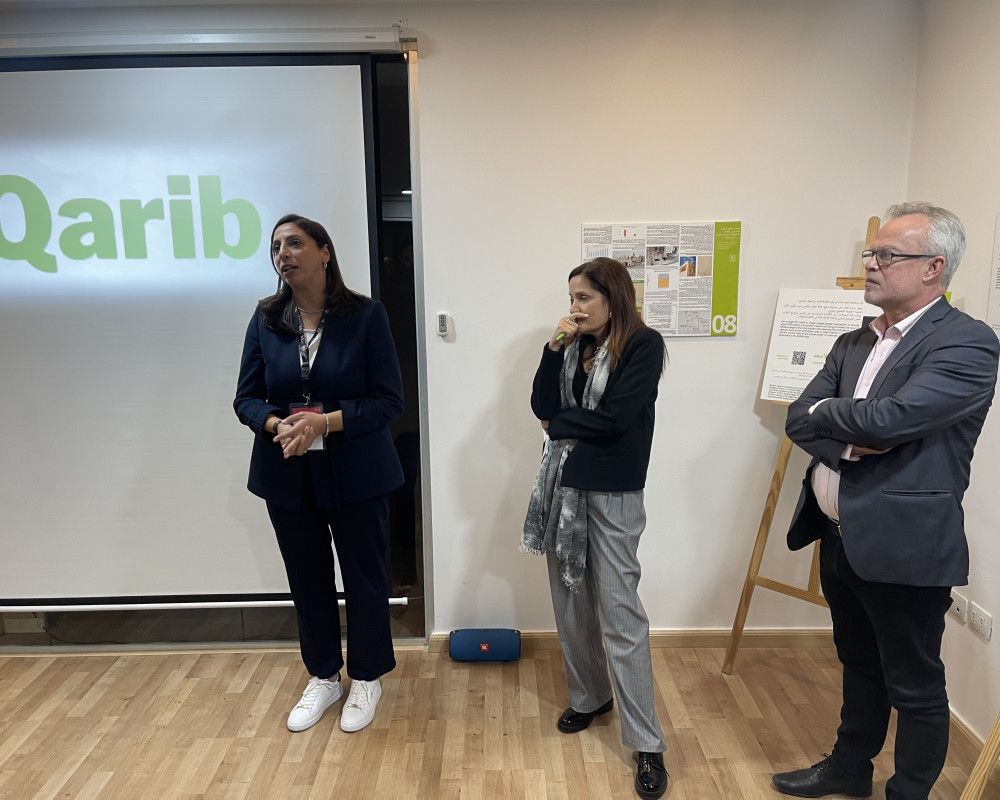

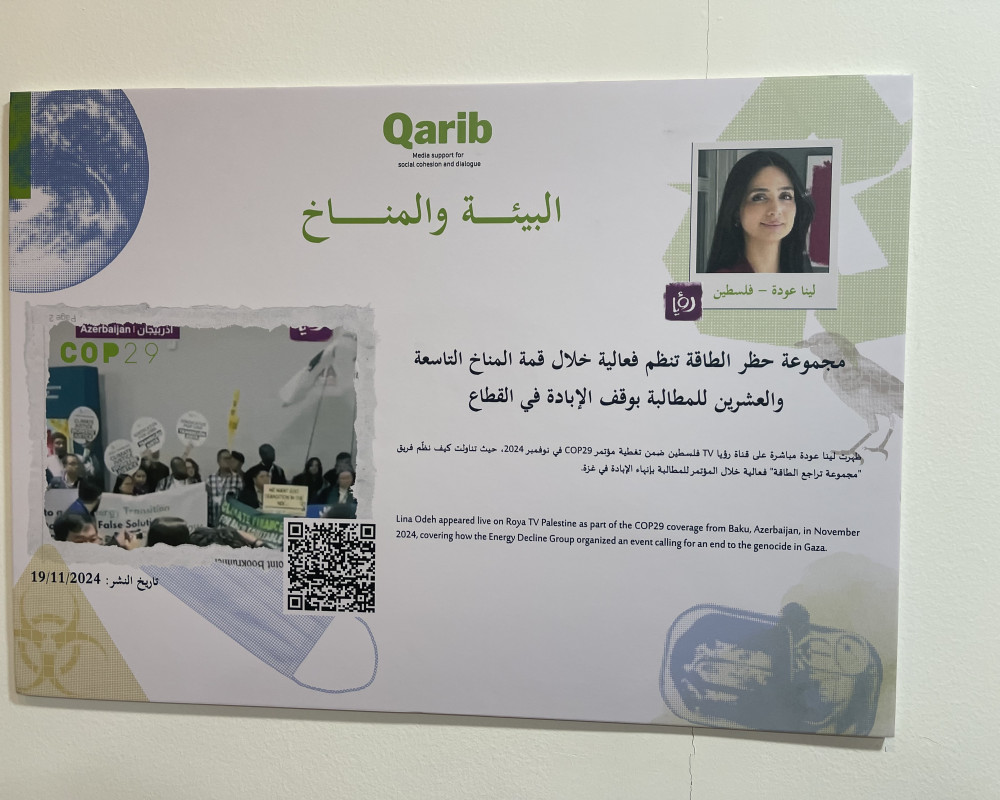
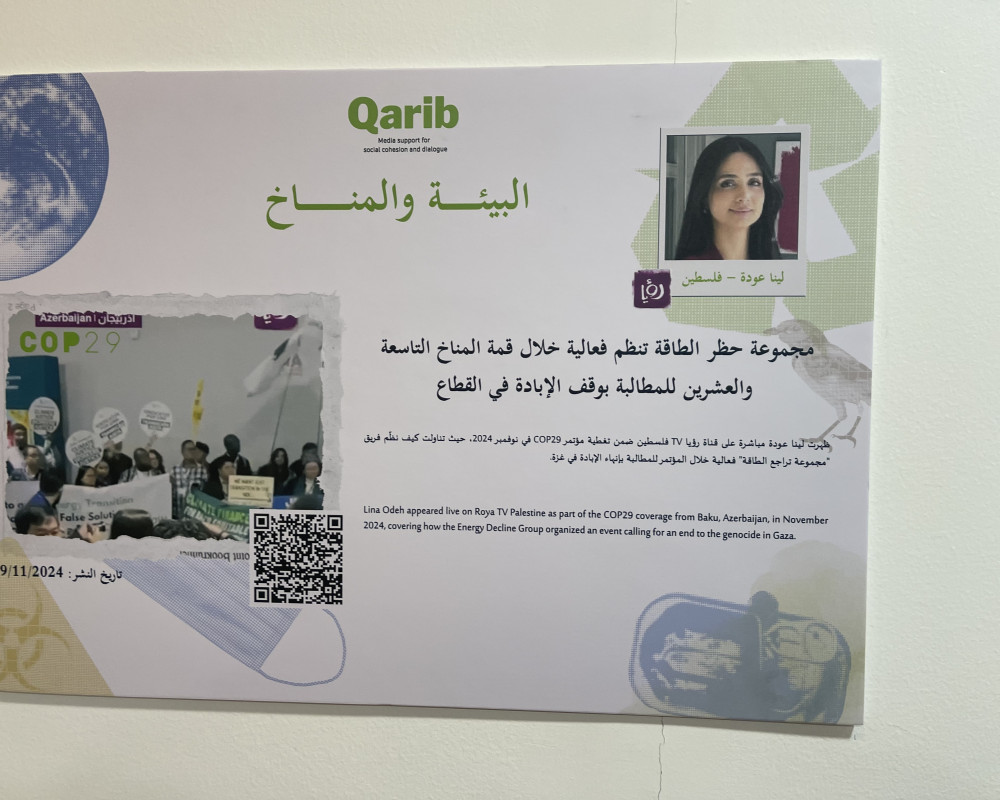
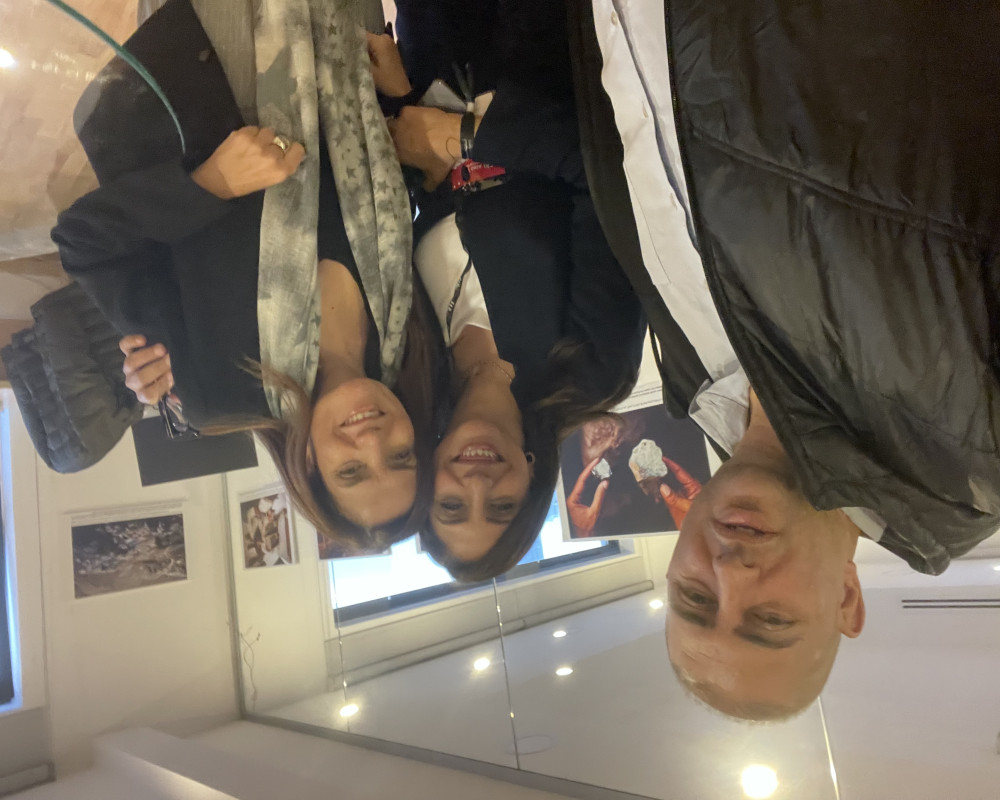
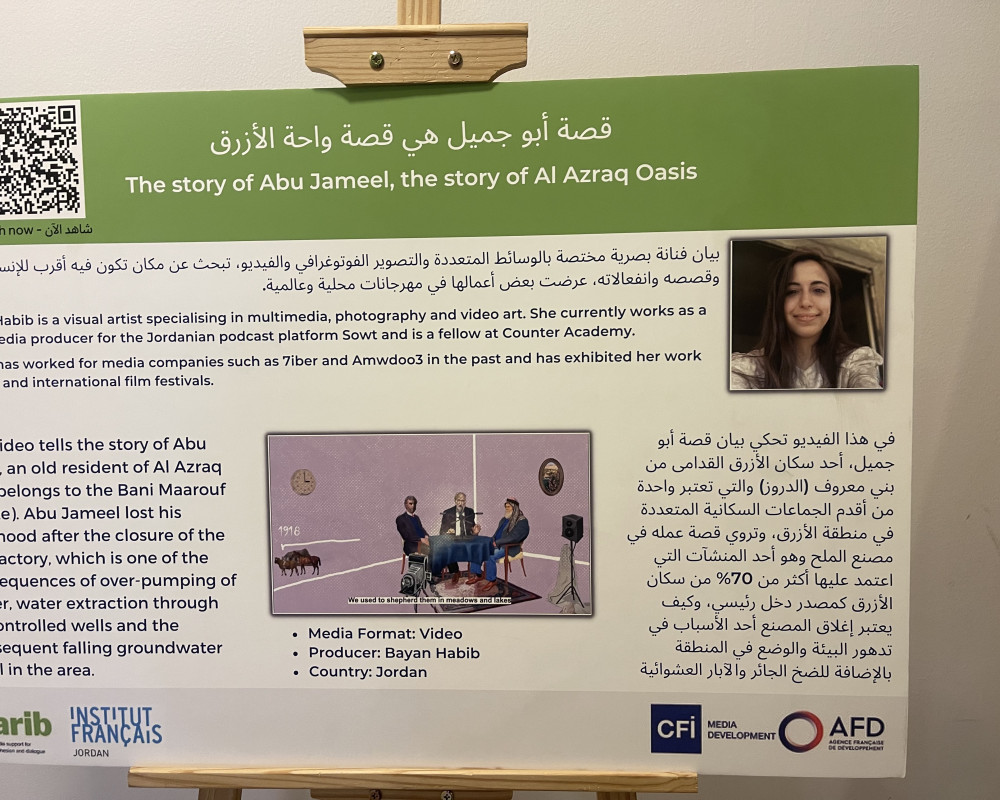
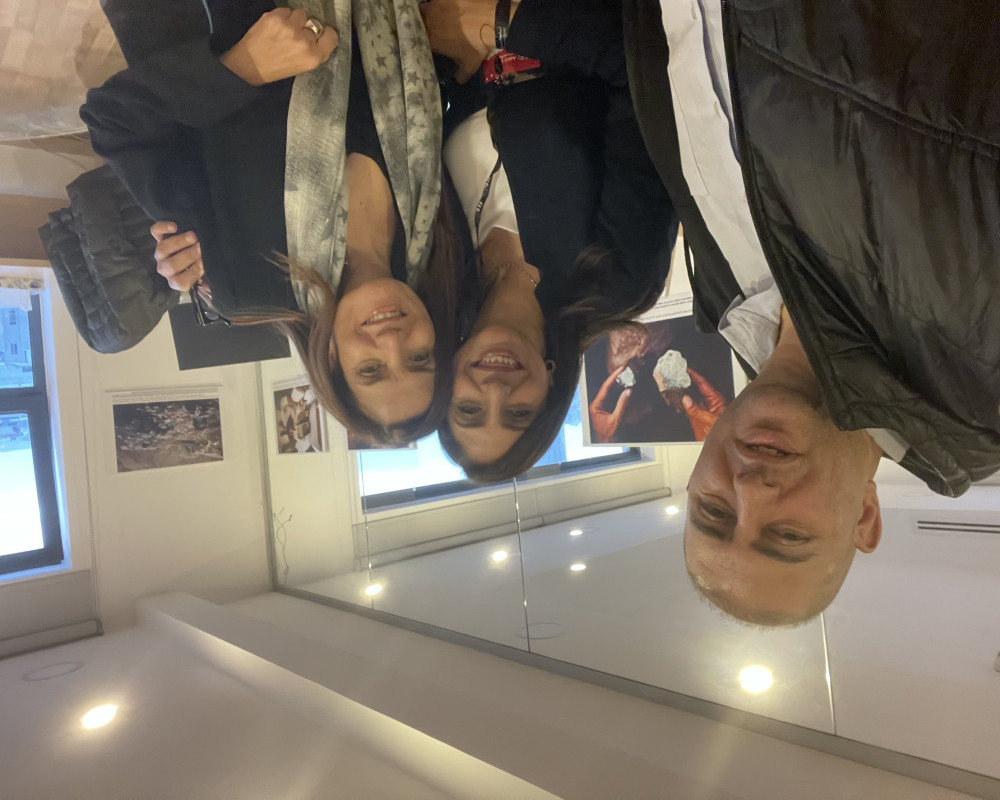



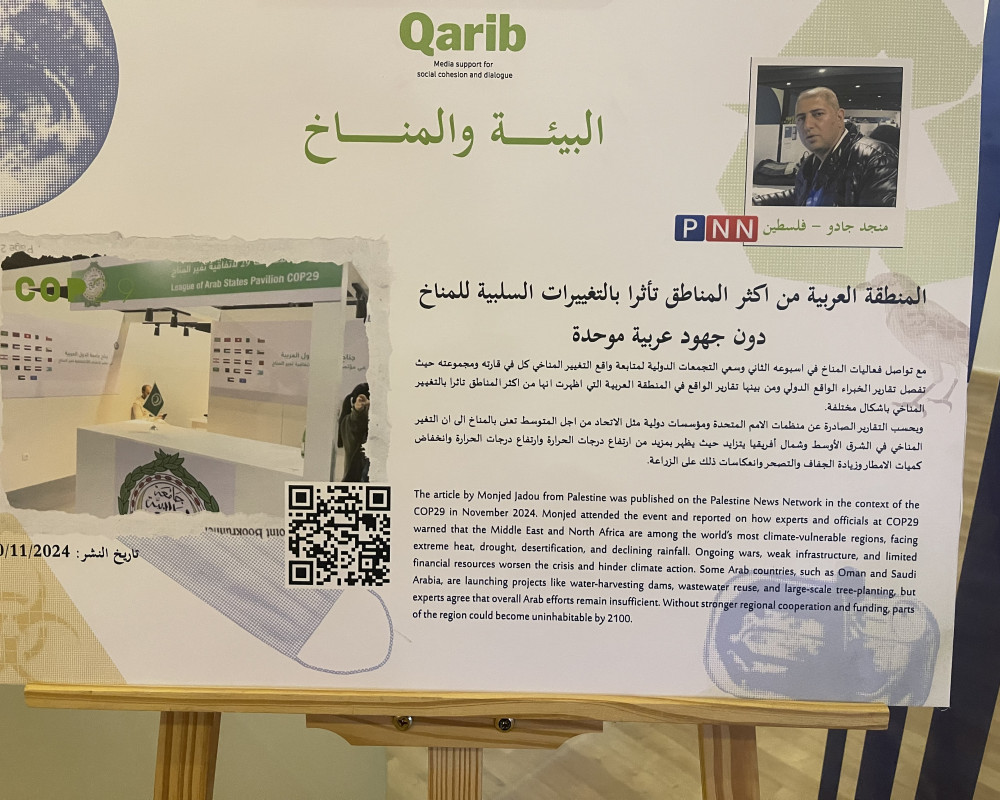
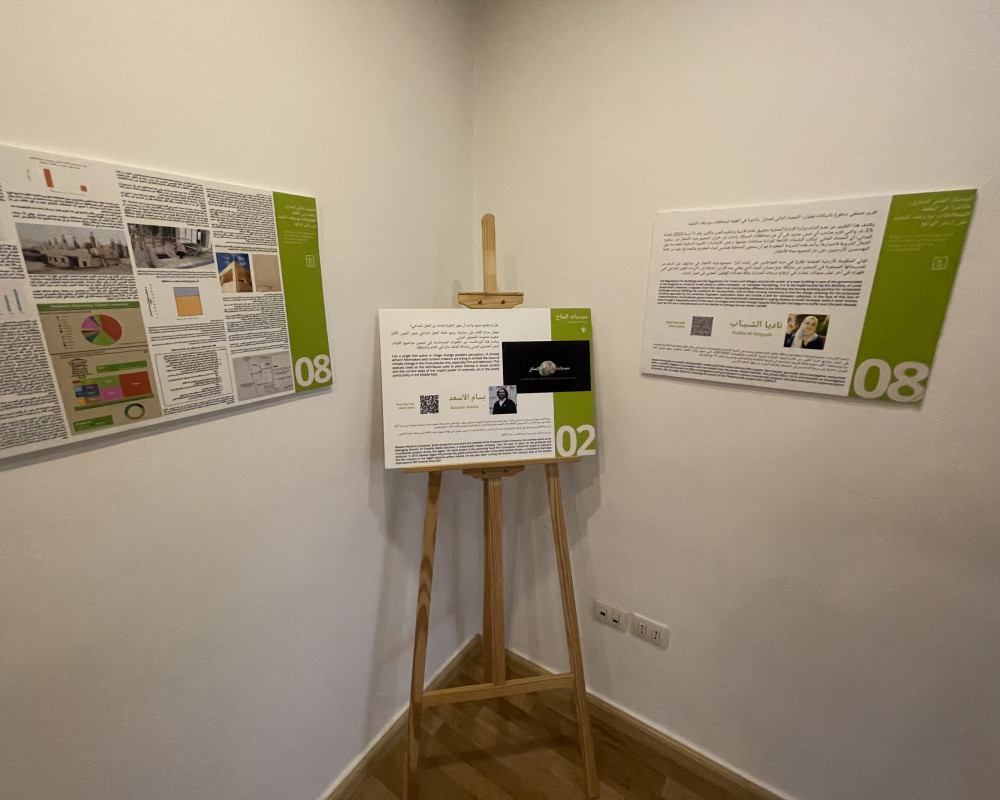
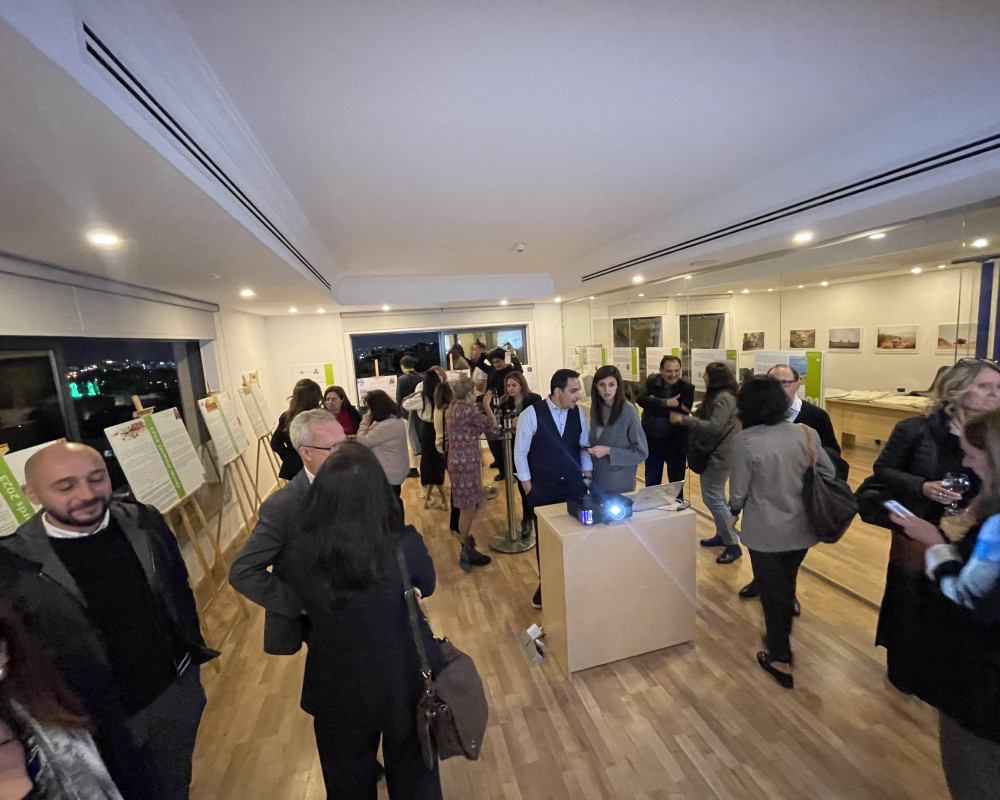

Source link
#CFI #Unveils #Climate #Environment #Media #Works #Jordan #Palestine #Lebanon #Iraq
Middle East
In Gaza Beauty expert’s lost dream
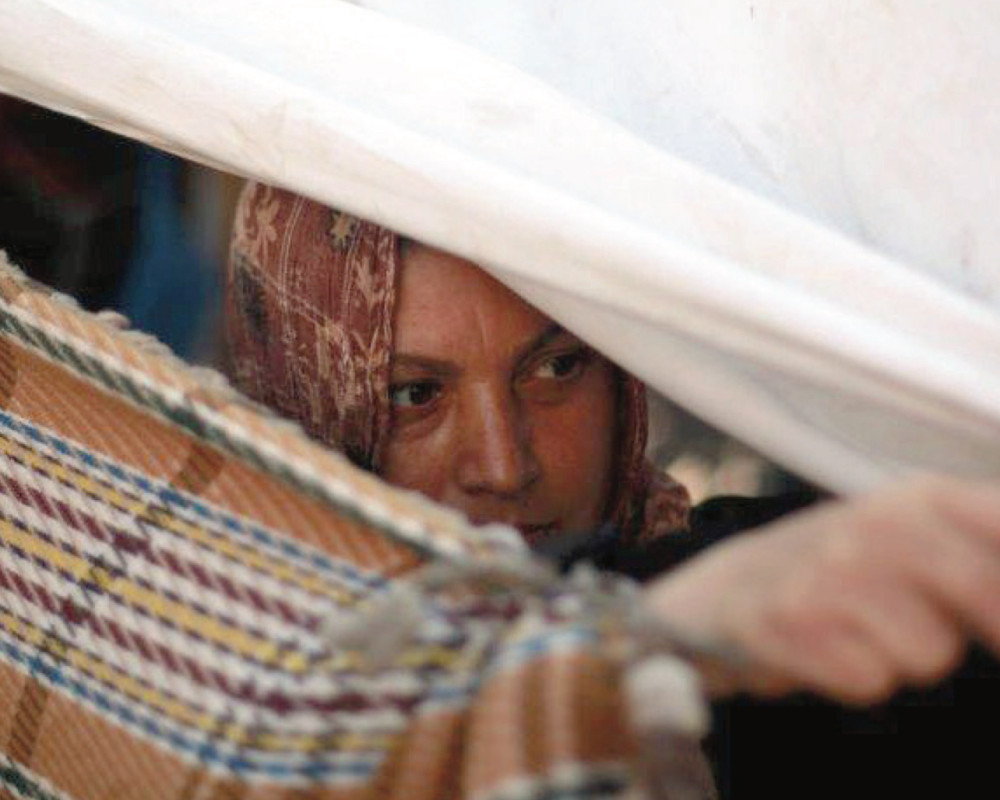
Gaza / PNN/ Iman Helas
For 13 years, Zeynep Hassouna patiently built a reputation as one of Gaza City’s most skilled beauty experts. In one single morning, Zeynep’s world and dreams shrank to a tent.
Today, Zeynep, 36, lives in a crowded tent in al-Yarmouk playground with her family and her brother’s. Piles of rubbish sit in front of the tent, occasionally emitting a foul stench and attracting flies.
“Before the war, I used to live as a queen — my business was excellent.” Zeynep managed to achieve remarkable success despite Israel’s 18-year blockade.
Women from the southern Strip traveled hours to her salon, Zain Salon, to have their hair or makeup fixed.
Her business was the source of income for her family and her brother’s as well.
In the first hours of war, Zeynep and her staff waited for clients, but none came. “In the [salon’s] street, hardly one man would pass every one hour or two,” Zeynep described the Sahaba Street, one of the most lively streets in Gaza City.
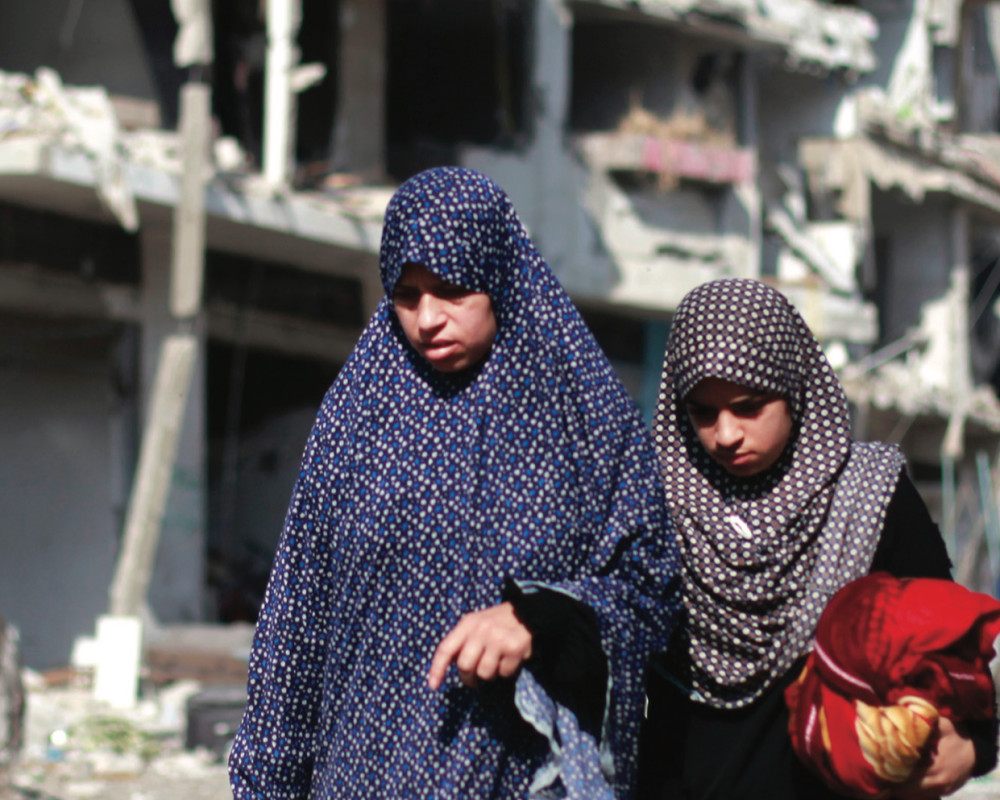
Feeling an upcoming calamity, Zeynep locked the salon by noon on October 7. She called the property owner to end the salon’s rental contract. “For a while,” she said, but that “while” extended for two years and is still ongoing.
The successful beauty expert became an evacuee. The Israeli army forced her to flee with her family to al-Shifa hospital, to al-Zarqaa neighborhood, to a tent in al-Yarmouk playground, to a tent in the southern Gaza Strip, and to a tent in al-Yarmouk playground once again.
Beauty for the Bereaved
Even with the salon closed, Zeynep tried to resume her work in any way. She called her regular clients, offering beauty services, but all said they could not. They were mourning one or more family members.
“Many of my clients were martyred. One woman was a regular client of mine with her five daughters — all of them were martyred. Some lost their husbands, and some lost their children.”
For the first 14 months of war, Zeynep did not gain one shekel.
According to Zeynep, one year and nearly two months into the war, people began to seek beauty experts. Her phone started ringing again, with women asking to do bridal makeup.
During that period, all of the brides Zeynep attended had experienced personal tragedy.
“I fixed makeup for a bride who lost both parents, a bride who lost her mother-in-law, and a bride who lost her brothers-in-law.”
“I also fixed up makeup for many war widows who were to marry their late husband’s brothers,” she added,
The makeup would be very simple, “just to get through the celebration.” During that period, celebrations were a way to cling to normalcy and tradition rather than a display of joy. Mourning families wanted to reclaim the means to smile and ensured to honor their martyred loved ones in the celebrations.
Zeynep’s work remained limited, not bringing in enough income to cover her family’s basic needs in the city with the [highest cost of living.
What if
“If I were able to work properly and bring any food, my nephew wouldn’t have eaten feces from the ground.”
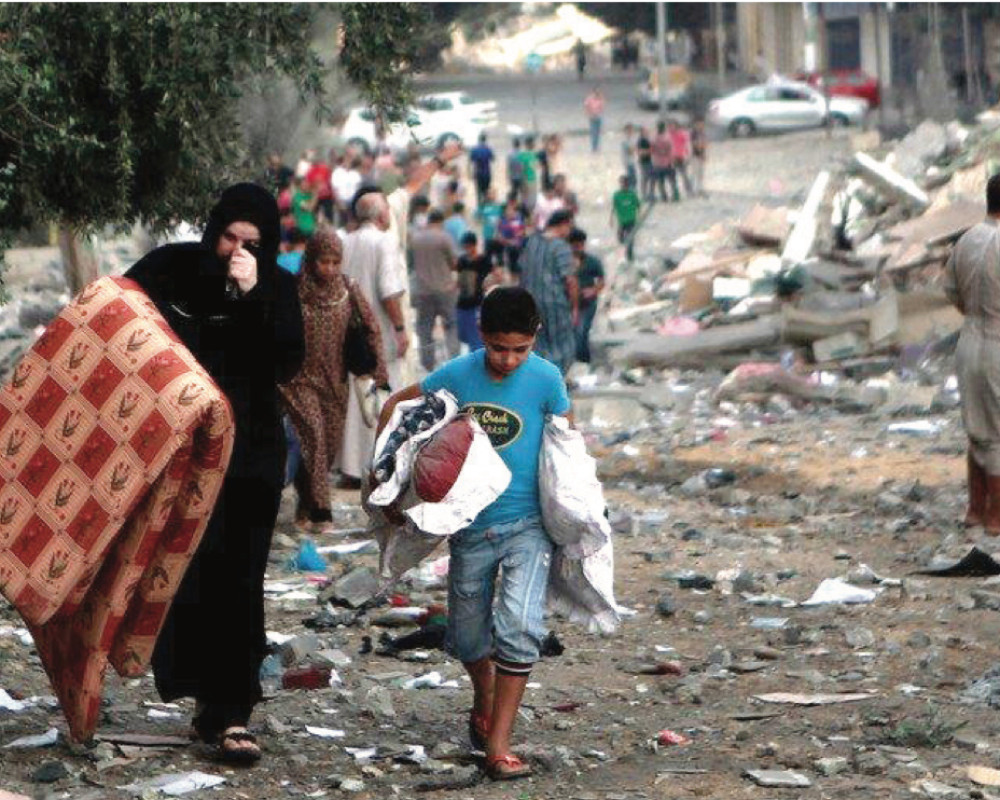
One morning during the harsh famine, Zeynep took her six-year-old nephew to a school to register for humanitarian aid during the famine. She left him at the door for just a moment.
When she returned, she found him sitting in the school bathroom, a tiny piece of bread in his small hand, pressing it into the dirt.
Zeynep tortures herself with the thought that her inability to work was the reason behind all of her family’s and her brother’s family problems.
Unlike many Gazans, Zeynep did not lose her home due to bombardment. Before that, the war deprived her of living happily in it, forcing her to be displaced repeatedly.
Eventually, her family was kicked out of the home, and did not find any place other than a simple tent sheltering them. It had taken Zeynep and her brother nine years to finally find an apartment spacious enough for both families. They lived in it for six years, where Zeynep’s nephews knew no other home. Losing it meant losing the last piece of normal life they could offer to the children.
“If I were working, we would not have been here in the tent. My mother would not have been in this state.”
Zeynep’s mother, 72, became paralyzed due to the harsh famine in northern Gaza. In the first days of famine, Zeynep’s mother began to see hallucinations suddenly.
“She was scolding us, telling unreal things, like why her brother was martyred and no one told her. She once hallucinated a bomb directed at her. I assumed it was a side effect of the high blood pressure drug. But when I took her to the hospital, she was diagnosed with a stroke in the brain.”
As the famine and the war intensified, Zeynep’s mother was diagnosed with three more strokes.
“My mother needs diapers because of her condition right now. But I can’t even afford to buy them.”
Unreached dream of beauty tent
Zeynep hoped that the ceasefire would allow her to work as before, to continue pursuing the dream she had left, and consequently to enhance her family’s and her brother’s lives. But the ceasefire fulfilled none of those hopes.
“Even after the ceasefire, the raw materials needed for my work were not available. For example, if a client asks me to dye her hair, I have to provide hair bleach powder, which is barely available in Gaza.”
Zeynep occasionally wanders the city searching for raw materials. If found, prices are often about 15 times their usual price. “The problem is I can’t buy and store them — these products spoil quickly, and I don’t have a salon that guarantees enough clients to use them all.”
This reality makes her consider opening a beauty tent to widen the circle of her clients.
“I am going to buy a tent and set it in the playground. One mirror, one chair — and I’ll resume work. I will start by offering the simplest services: cutting hair, removing facial hair, or shaping eyebrows.”
“I wish I could reopen my past salon, but I no longer have the capacity to do that.”
This expert’s current aim is a bitter contrast to her former ambition. Before, she put great effort into saving money to buy advanced machines that are rarely found in Gaza, dreaming of having the Strip’s only salon of its kind.
Normally, a beauty salon would have air conditioners to protect makeup from melting in the heat; the fabric of the tent traps the heat instead. On rainy days, Zeynep has to stay cautious, ensuring the rain does not seep into the tent, ruining everything.
She will not be able to leave the tent even during the night, fearing theft, especially in the state of [chaos](https://www.theguardian.com/world/2025/may/07/desperate-traumatised-people-gaza-faces-wave-of-looting-theft-and-violence) that overwhelmed Gaza following the war.
But even this simple yet challenging dream is unreachable for Zeynep. She needs to buy another tent to pursue her dreams, but her mother’s medical care consumes every shekel she spares.
Zeynep knows that she can no longer restore what the war deprived her of. Her wide salon, her mother’s health, her nephews’ memories of stability — all belong to the past now.
Despite this, Zeynep still wanders the Strip, searching for raw materials, and walks long distances to her clients’ houses, with her dream of owning the Strip’s only salon of its kind in her mind
Source link
#Gaza #Beauty #experts #lost #dream
Middle East
Foreign Diplomats Tour Bethlehem, Voice Support for Reviving Palestine’s Tourism Sector

BETHLEHEM, West Bank / PNN /
The Palestinian Ministry of Tourism and Antiquities organised a tour on Tuesday in Bethlehem for members of the diplomatic corps accredited to the State of Palestine, aiming to brief them on conditions in the governorate amid Israeli occupation measures and on Palestinian efforts to revive and develop the tourism sector as a key tool for promoting Palestinian culture and strengthening the local economy in Bethlehem and across Palestine.
Several foreign diplomats expressed support for the Palestinian people, stressing the importance of enhancing cooperation through the development and expansion of tourism programmes. They also encouraged their citizens to visit Palestine — including Bethlehem and its historic sites — describing the city as calm and fully prepared to receive visitors.
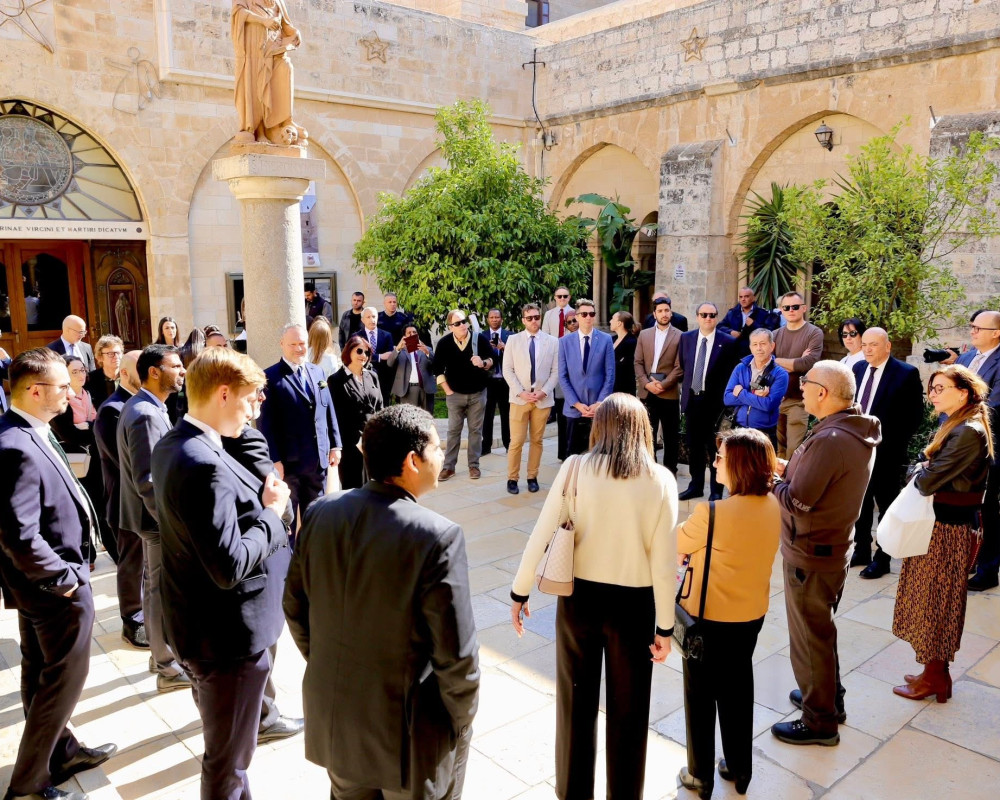
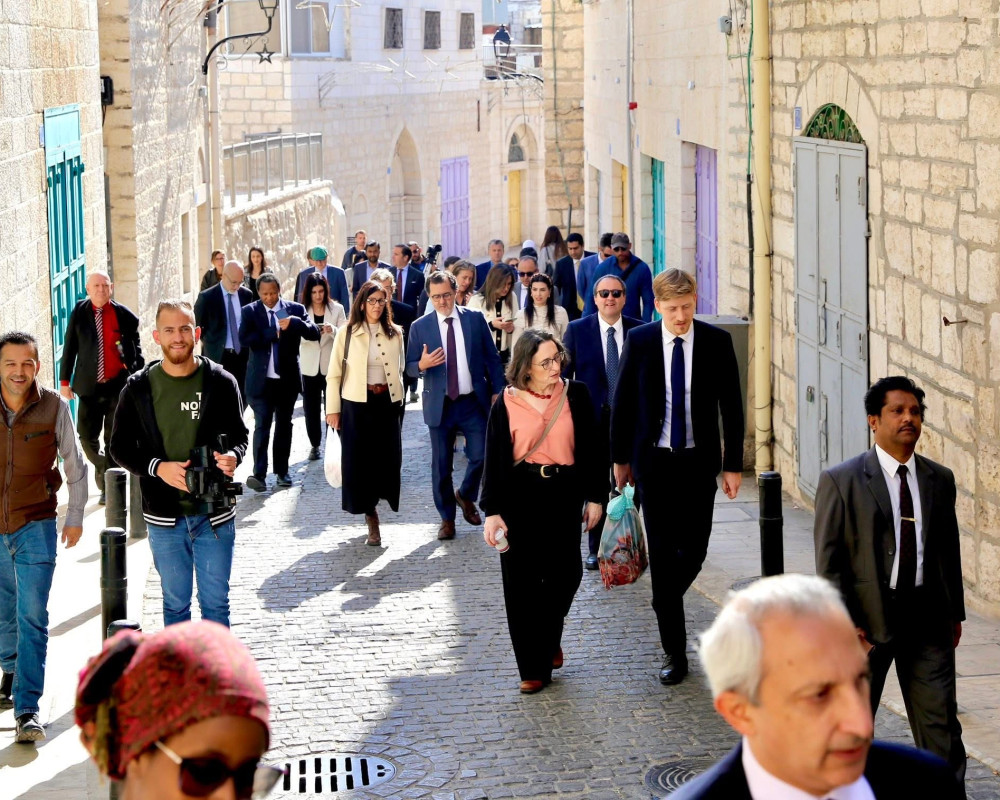
The tour, which included dozens of diplomats and representatives of international institutions, featured stops at the Walled-Off Hotel, the Palestinian Heritage Museum, the Church of the Nativity, Star Street and the Saint Elias Hotel. Minister of Tourism and Antiquities Hani Hayek, Bethlehem Governor Mohammad Taha Abu Alia, and Bethlehem Mayor Maher Qanawati accompanied the delegation, briefing them on the ministry’s and private sector’s efforts to attract tourism groups from around the world and to strengthen direct cooperation between Palestinian tourism institutions and their counterparts abroad.
Palestinian Tourism Minister Hayek highlighted the ministry’s international outreach efforts to reaffirm that Palestine is ready to welcome visitors from all countries. “Bethlehem in particular, and Palestine in general, are safe and fully prepared to receive tourists from across the world,” he said.
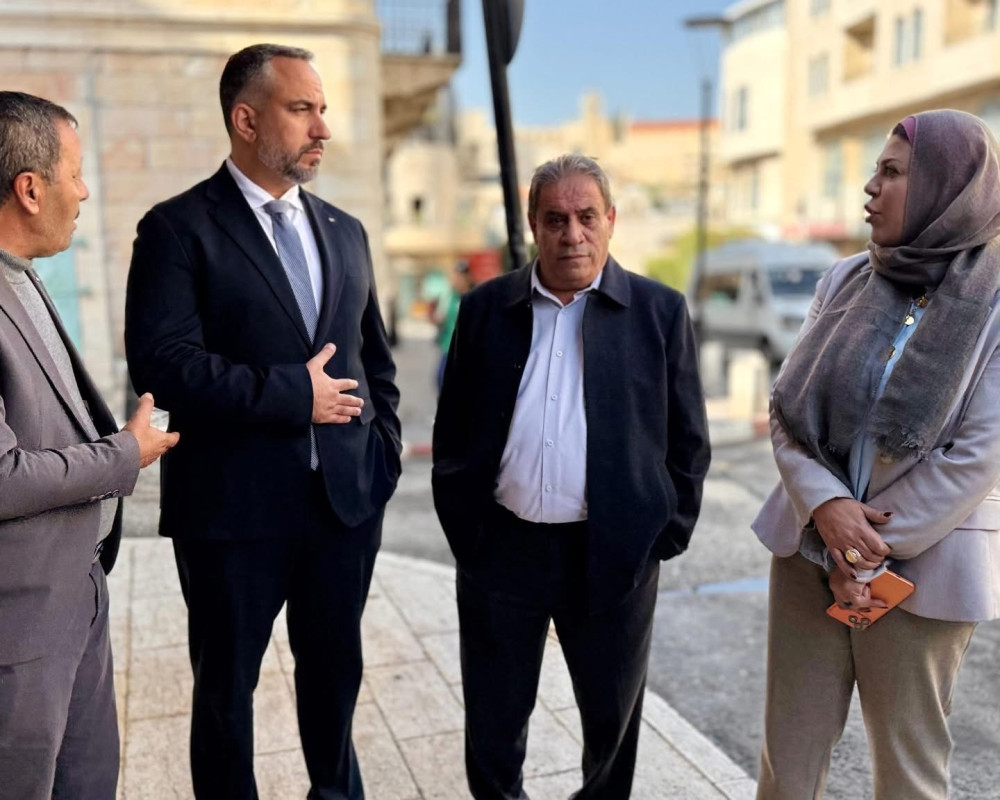
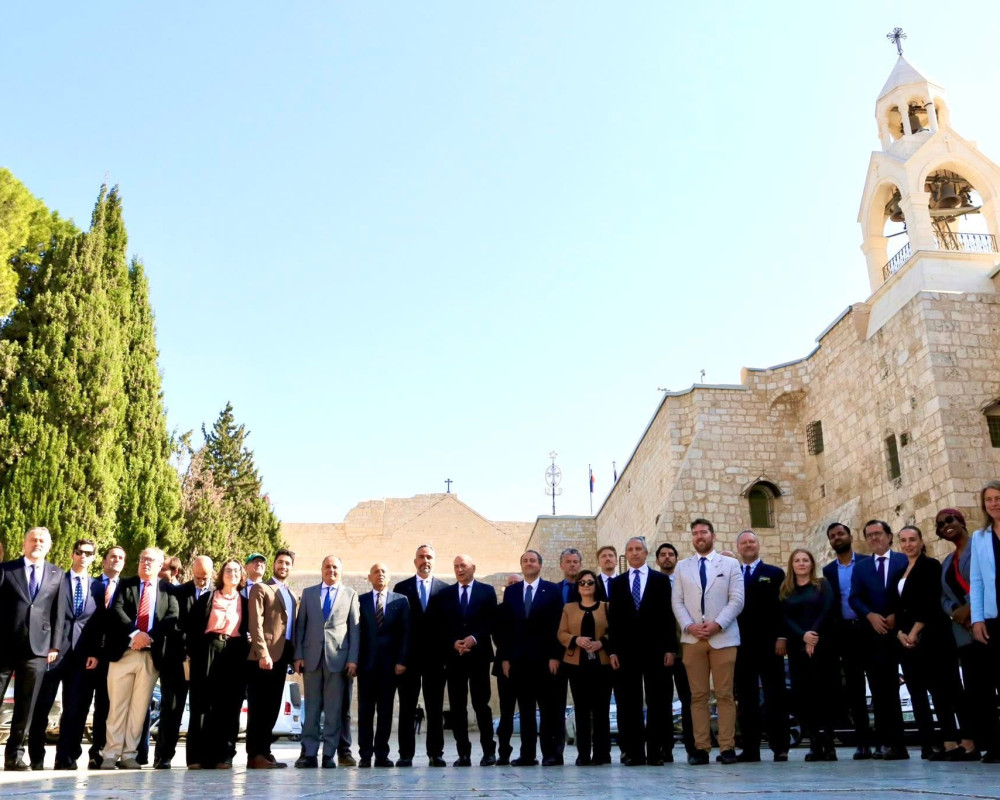
Hayek said the ministry is working to restore tourism activity to its pre-crisis levels, noting that Palestine remains a beacon for travellers from diverse backgrounds. “By visiting Palestine, tourists can learn the truth about the Palestinian people — a hospitable nation rooted in this land and in its history,” he added.
He also briefed diplomats on the importance of the tourism sector to Palestine, describing it as one of the pillars of the national economy, a major source of national income, and a primary livelihood for many Palestinian families, as well as Palestine’s gateway to the world.
For his part, Bethlehem Governor Mohammad Taha Abu Alia underscored the significance of the tourism sector as an essential platform for presenting the history and identity of the Palestinian people to the world.
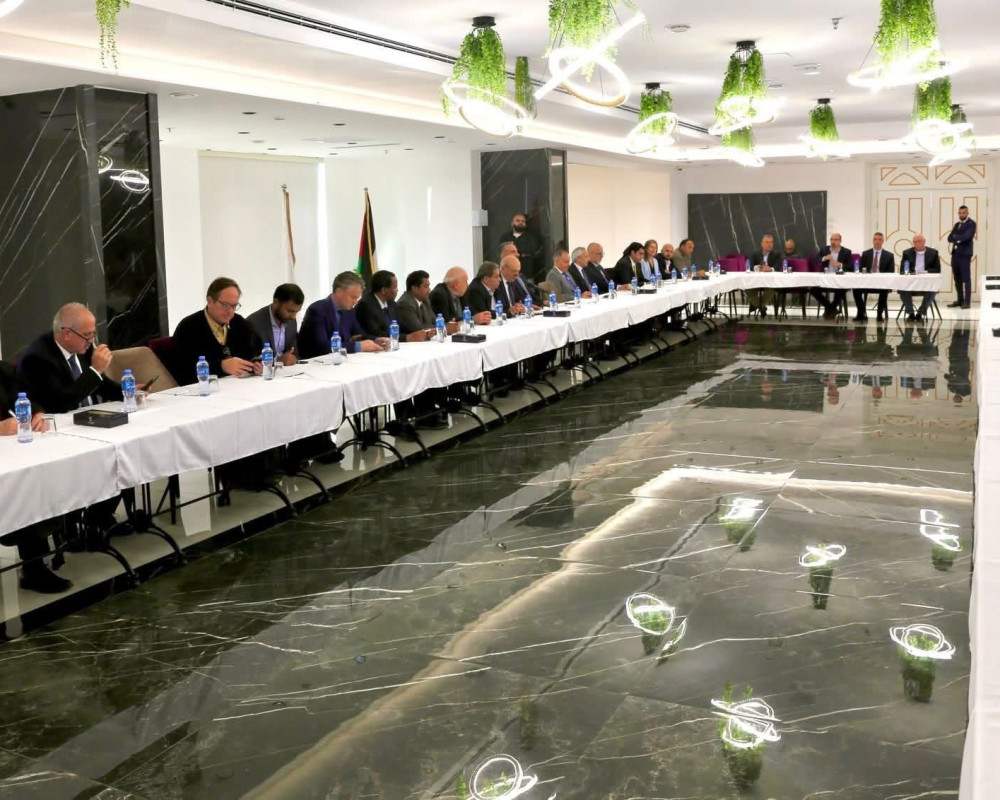
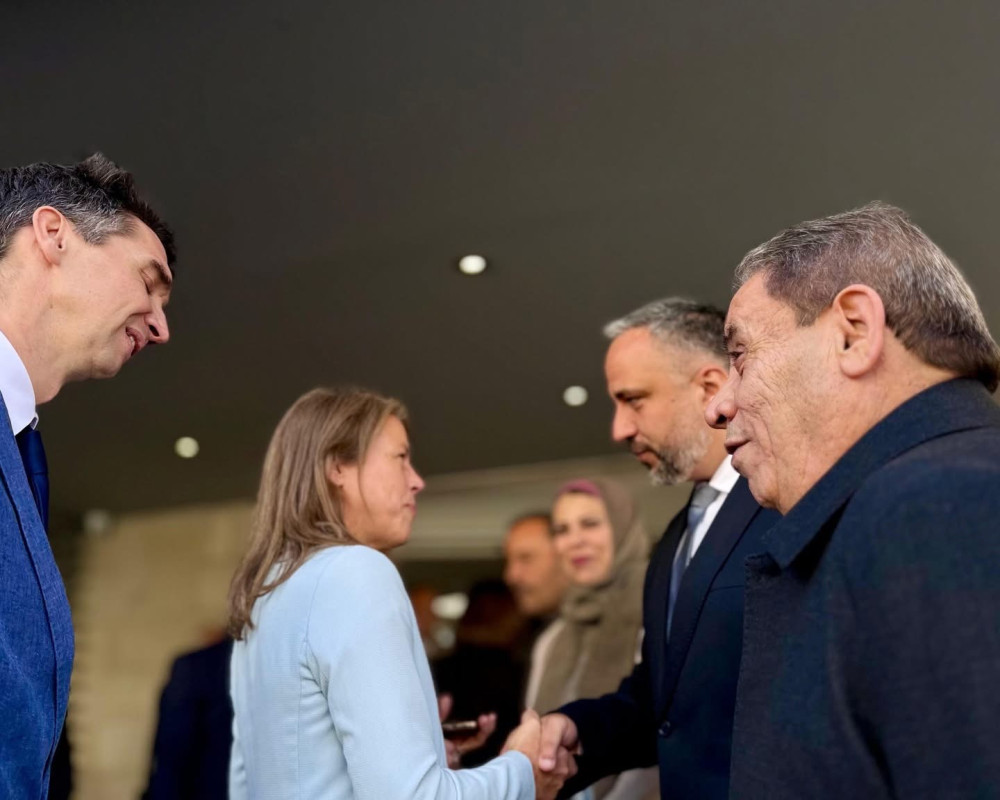
He praised the Ministry of Tourism and Antiquities for enhancing Palestine’s presence on the global tourism map, saying the sector plays a vital role in conveying the Palestinian narrative and showcasing success stories that reflect the resilience of Palestinians and their attachment to their land and heritage.
Bethlehem Mayor Maher Qanawati reaffirmed the city’s readiness to welcome tourists from all corners of the world, noting that the people of Bethlehem warmly receive visitors and tourism groups. He thanked the Ministry of Tourism and Antiquities for its efforts to promote the Palestinian tourism sector internationally.
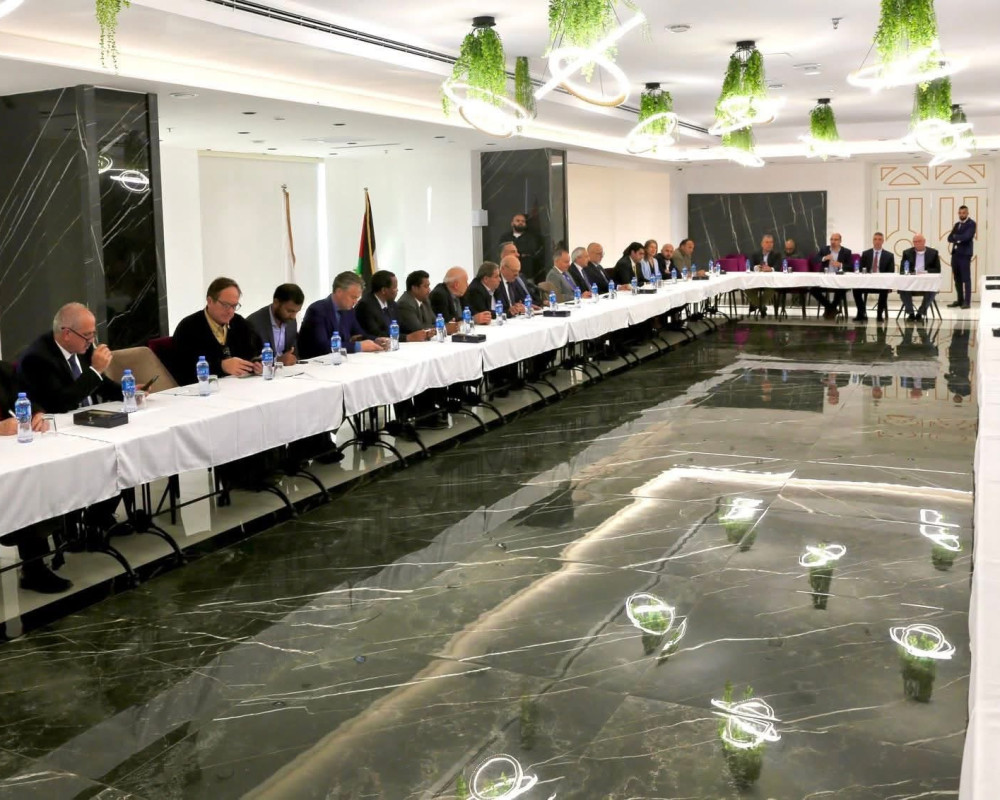
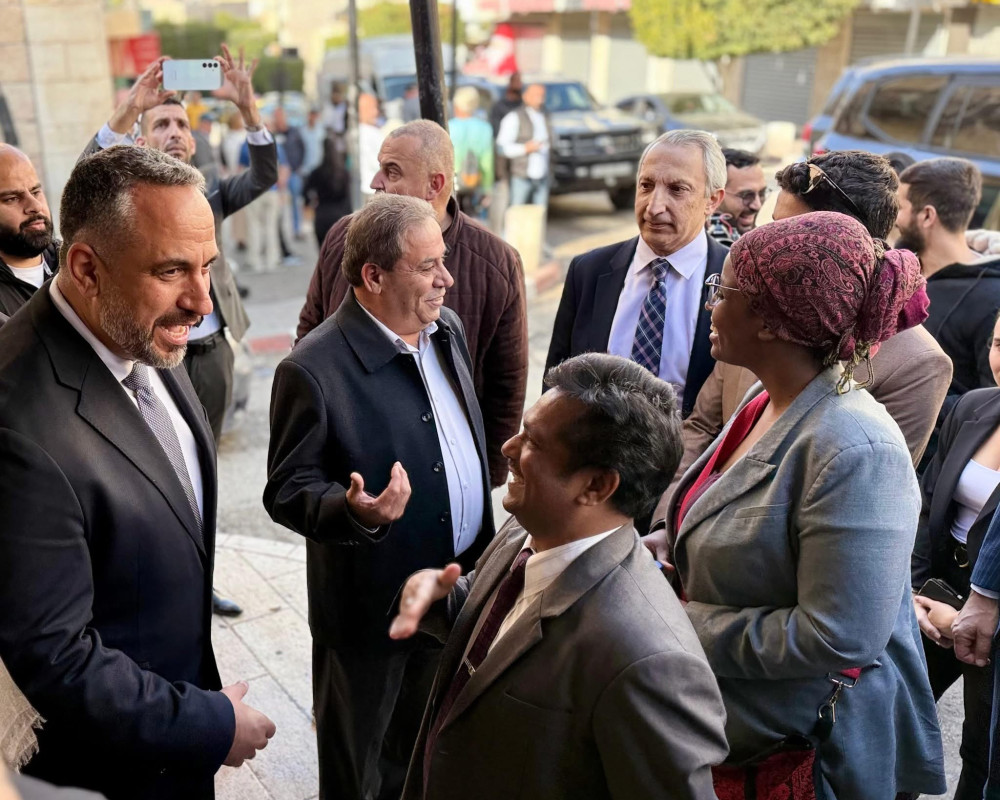
Source link
#Foreign #Diplomats #Tour #Bethlehem #Voice #Support #Reviving #Palestines #Tourism #Sector
-
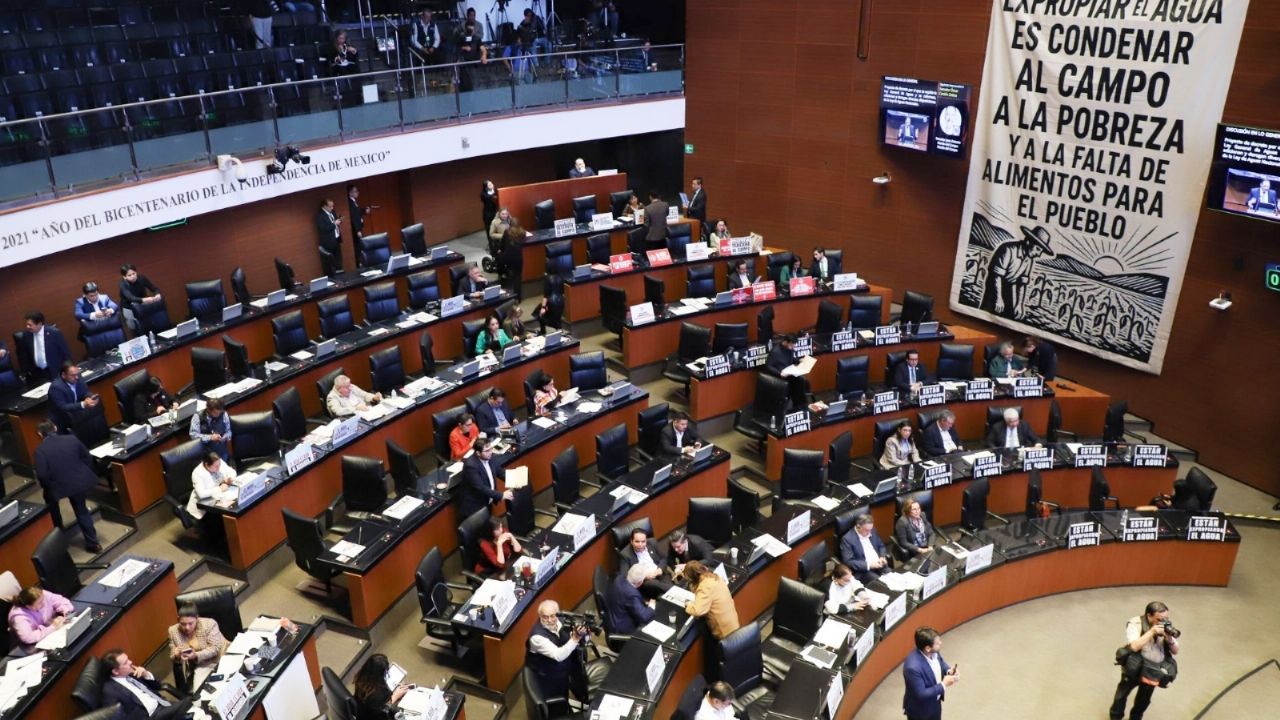
 United States23 hours ago
United States23 hours agoIn an accelerated procedure and without modifications, the Senate approves the minutes of the Water Law
-

 United Kingdom23 hours ago
United Kingdom23 hours agoEdinburgh Airport flights grounded as travelers see plans scuppered due to IT glitches
-

 Ireland23 hours ago
Ireland23 hours agoIrish peacekeepers “realized” after coming under fire in Lebanon
-

 United States23 hours ago
United States23 hours agoLeBron James’ 19-year double-digit scoring streak ends – VIDEO
-

 United Kingdom23 hours ago
United Kingdom23 hours agoA region of the UK where house prices are soaring – while prices stagnate elsewhere
-

 Ireland23 hours ago
Ireland23 hours agoWatchdog brings forward deadline for car finance companies to deal with complaints – The Irish News
-

 News & Knowledge / Facts23 hours ago
News & Knowledge / Facts23 hours ago3.3 million retirement savers facing salary sacrifice changes
-

 Humor & Entertainment23 hours ago
Humor & Entertainment23 hours agoMeghan Markle launches £9 Christmas chocolate bars



